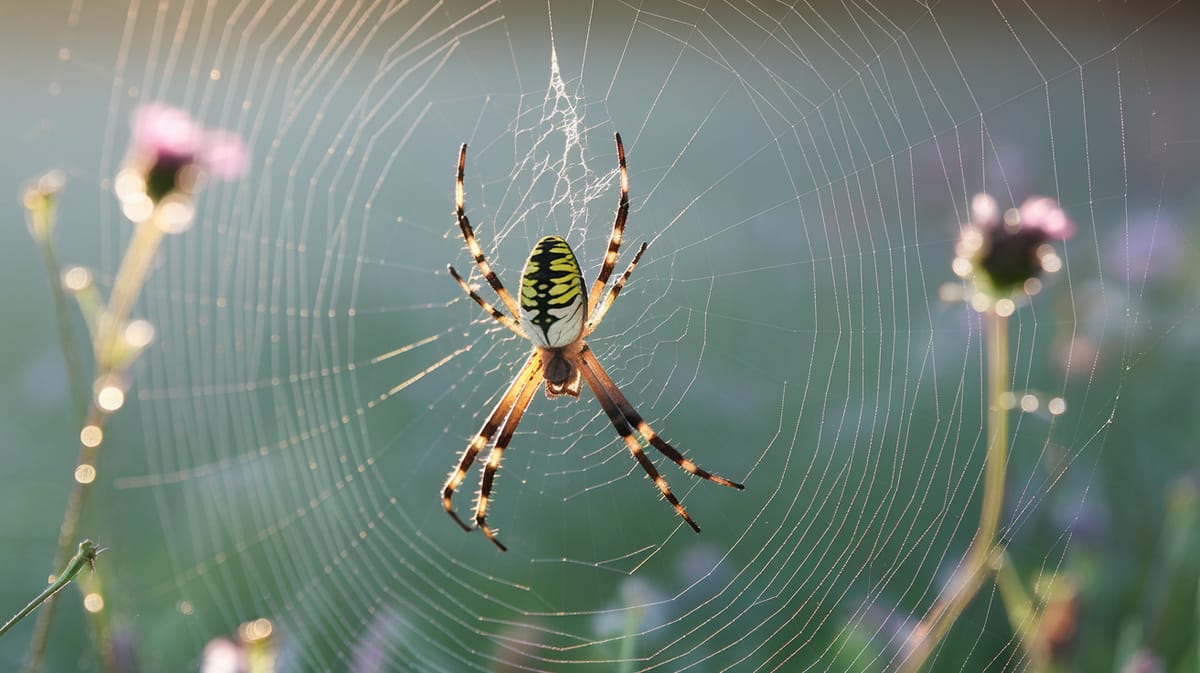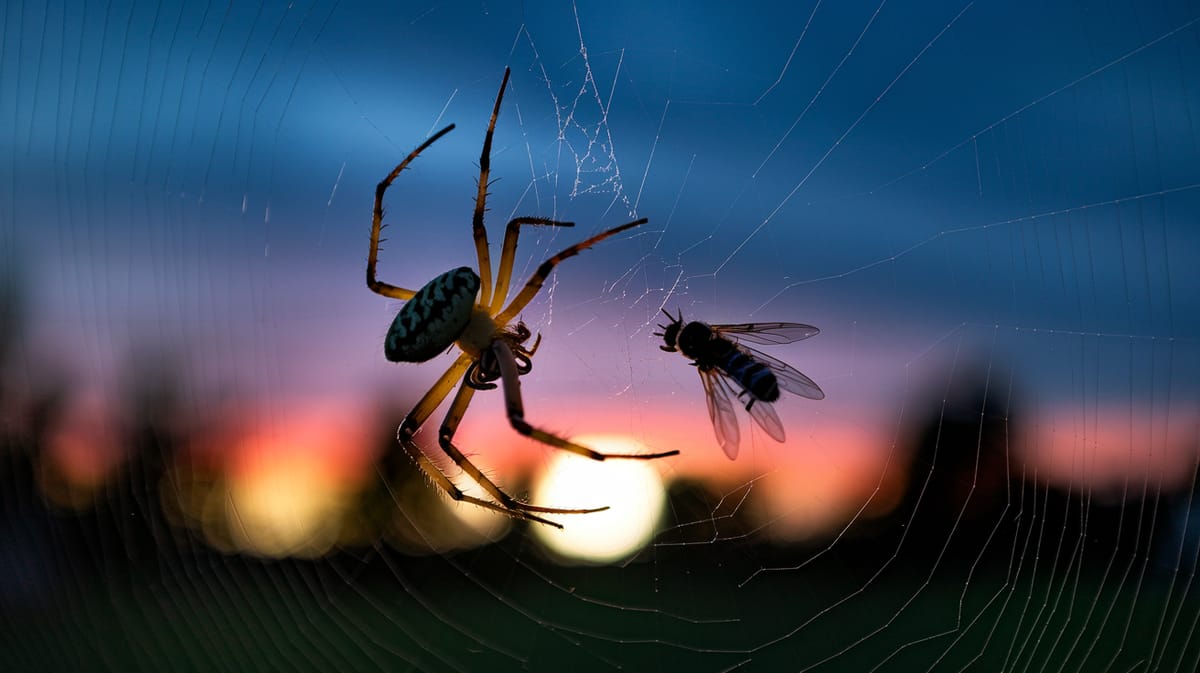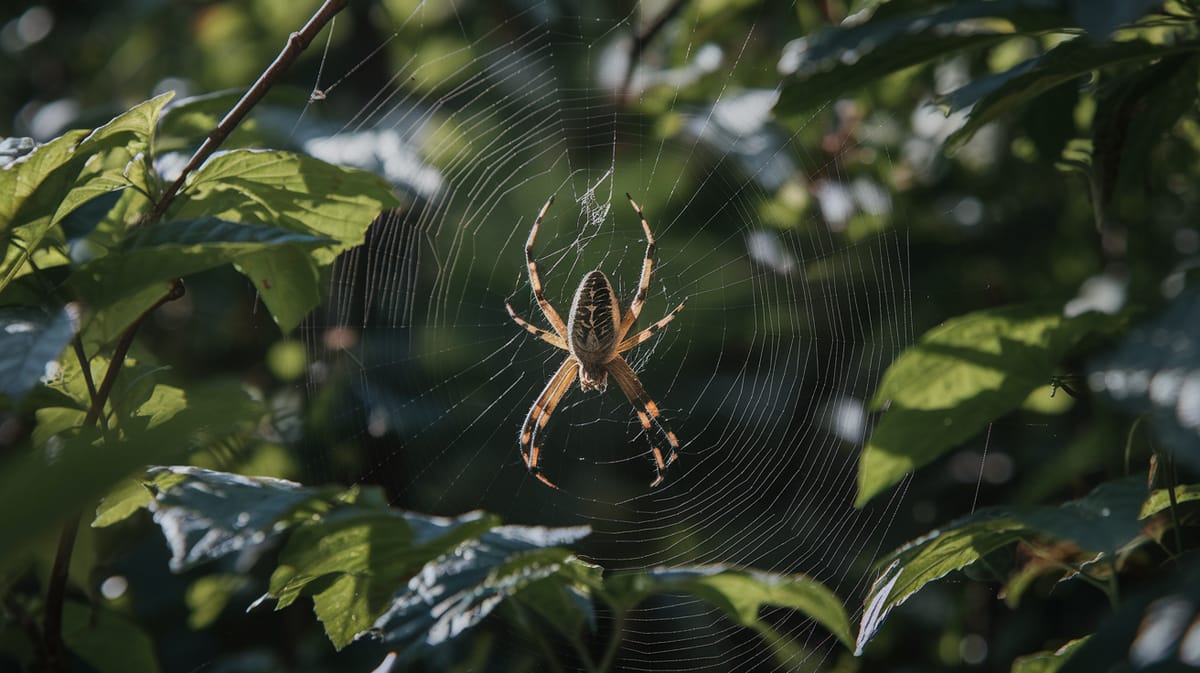Garden Spider
Architect of intricate webs, the Garden Spider blends beauty and utility, weaving silken traps to capture prey. Its vibrant colors and patterns add splendor to any garden ecosystem.

Key Insights at a Glance
Did You Know?
Taxonomy & Classification
Garden spiders, known for their striking orb webs and vibrant coloration, exhibit fascinating adaptations that aid in prey capture and survival. Let's understand the evolutionary journey and classification of these remarkable predators.
Global Distribution
Argiope species thrive on every continent except Antarctica, illustrating their adaptability to diverse environments and climates.
Evolutionary Resilience
Originating over 140 million years ago, garden spiders have persisted through significant environmental changes, showcasing their evolutionary adaptability.
Lifecycle and Growth
A remarkable journey of transformation from Egg to Adult.
Egg
Eggs are laid in a silken sac, which offers protection against predators and environmental conditions until hatching.
Spiderling
Spiderlings disperse by ballooning on silk threads, allowing them to colonize new areas and find resources.
Adult
Adults construct orb webs to capture prey efficiently and engage in mating to produce the next generation.
Dietary Habits
A masterful hunter using its web, this spider targets insects, adjusting its diet to seasonal and available prey.
| DIET TYPE | DESCRIPTION |
|---|---|
| Primary Diet | Primarily captures flying insects like flies, mosquitoes, and moths, efficiently trapping them in its intricate web. |
| Secondary Diet | Occasionally consumes small insects such as grasshoppers and beetles, supplementing its diet depending on their availability. |
| Occasional | Rarely feeds on small vertebrates like tiny frogs or lizards if they become entangled in its web. |

Behaviour and Adaptations
Discover the unique adaptations that make the Garden Spider a skilled architect and predator.
Web Construction
Builds intricate orb webs to efficiently catch prey.
Venom Efficiency
Delivers quick-acting venom to immobilize prey.
Camouflage
Blends into surroundings to avoid predators.
Ecosystem Impact
Balancing ecosystems with the Garden Spider's unique contributions.
Natural Pest Control
Garden Spiders help control insect populations by feeding on pests like aphids and beetles.
Food Web Support
Serves as prey for birds and small mammals, supporting biodiversity.
Web Engineering
Constructs intricate webs that capture flying insects, maintaining ecosystem health.
Conservation Challenges
Understanding and addressing the major threats to Garden Spider populations.
Habitat Loss
Urban development reduces available habitats, affecting spider survival.
Pesticide Use
Chemicals in agriculture harm spider populations and ecosystems.
Climate Change
Changing weather patterns disrupt breeding cycles and food availability.
Frequently Asked Questions
How long do Garden Spider live?
Garden Spiders typically live for about one year. They hatch in spring, reach adulthood by late summer, and die by fall after laying eggs. The eggs survive through winter to hatch in the next spring, continuing the cycle.
What do Garden Spider eat?
Garden Spiders primarily eat flying insects such as flies, mosquitoes, and moths. They catch their prey in their intricate webs, which they build in gardens and grassy areas. Their diet helps control insect populations in their habitat.
Are Garden Spider poisonous?
Garden Spiders are not poisonous to humans. They do possess venom to subdue their prey, but it's harmless to people. They are generally harmless and avoid human contact, only biting in self-defense if provoked.
Are Garden Spider endangered?
Garden Spiders are not considered endangered. They are common across many regions and thrive in various environments, including gardens and fields. Their population is stable, and they play a crucial role in controlling insect populations.
What do Garden Spider symbolize?
Garden Spiders often symbolize creativity, patience, and persistence due to their web-building skills. In various cultures, they are seen as symbols of good fortune, balance, and the interconnectedness of life. Their presence in gardens is usually considered a positive sign.
Do Garden Spider bite?
Garden Spiders can bite if threatened, but their bites are rare and generally harmless to humans. They prefer to avoid confrontation and focus on capturing insects in their webs. If bitten, symptoms are mild, such as slight irritation or redness.
What color are Garden Spider?
Garden Spiders are typically yellow and black. Their distinctive, often bold coloring helps them blend into flowers and foliage, providing camouflage while they wait for prey. The vibrant patterns can vary slightly, depending on the individual spider and its environment.
Does a Garden Spider have wings?
Garden Spiders do not have wings. They rely on their eight legs to move and create webs. Their ability to spin intricate webs is key to their survival, as it allows them to catch prey and reproduce successfully.
What does a Garden Spider look like?
Garden Spiders are recognizable by their large size, long legs, and striking yellow and black patterns. Females are larger, with elongated bodies, while males are smaller and less colorful. Their webs often feature a unique zigzag pattern.
Is a Garden Spider an insect?
Garden Spiders are not insects; they are arachnids. Unlike insects, they have eight legs and two main body segments. Arachnids also lack antennae and wings, distinguishing them from the insect class. They are part of the spider family, known for their web-spinning abilities.
Related Insects
Discover insects with similar characteristics to Garden Spider - including shared habitats, diets, and taxonomic classifications
Share this profile
Help others discover Garden Spider
